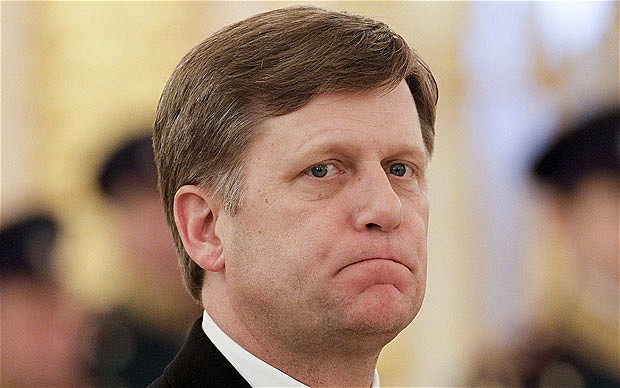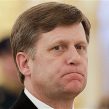
US Ambassador in Russia Under Fire, Again
Publication: Eurasia Daily Monitor Volume: 9 Issue: 103
By:

US ambassador to Russia Michael McFaul – former director for Russia and Eurasia on the US National Security Council, considered the architect of President Barack Obama’s “reset policy” of improved US-Russian relations – arrived in Moscow last January and almost immediately got into trouble. A number of opposition Duma deputies met with McFaul and Deputy Secretary of State William Burns on January 17 at the US embassy. These deputies were swiftly denounced by state-controlled TV, the ruling United Russia (UR) party and by the flamboyant leader of the populist and nationalist Liberal Democratic Party (LDPR), Vladimir Zhirinovsky, for committing “treason” – of “taking instructions from Western spies.” McFaul was accused of being a “specialist in Orange revolutions,” who conspired with the opposition to undermine Vladimir Putin’s regime by organizing street protests. The Duma ethics committee censured the opposition deputies, who met with McFaul (EDM, January 26).
Since that ugly start of his diplomatic career, McFaul had worked hard to improve his standing with Russian authorities, stressing Obama’s strong commitment to “reset” while in meetings with officials and in interviews on state-controlled media. McFaul complained his command of Russian was somewhat slipping “after 17 years living outside of Russia” and apologized for calling Russia a “wild country.” McFaul told journalists: “It was a mistake; I’m not a professional diplomat.” McFaul stressed that meeting opposition leaders and parliamentarians is normal diplomatic practice (RIA Novosti, April 3).
The attack on McFaul boosted the Kremlin PR drive. According to Mikhail Pashkin, the police trade union’s coordinating council chairman, “many servicemen of the Moscow specialized riot police [OMON] actually believe the street protests in Moscow are financed from abroad.” The key argument, according to Pashkin, is the January opposition meeting with McFaul. Pashkin talked with policemen after the OMON brutally attacked protesters on May 6 (https://echo.msk.ru/blog/pashkin/892098-echo/, May 24).
McFaul’s apologies seemed to have been at least partially accepted. Last week, McFaul had a meeting with a group of UR Duma deputies, led by the head of the UR faction, Andrei Vorobyev. Opposition deputies of the Just Russia faction called for the Duma ethics committee to consider censuring the UR for its meeting with McFaul, but the motion was rejected. Vorobyev declared that the UR wants a “maximum of dialogue and an exchange of views, because Russia is a free and democratic nation.” McFaul expressed readiness for such dialogue, adding that most US-Russian problems arise “because of what [the US] Congress does” (Kommersant, May 26).
This partial rehabilitation of McFaul was extremely short-lived. Last week, on May 25, McFaul lectured students at one of Moscow’s most prestigious universities – the Higher School of Economics – and his address caused a major diplomatic crisis. McFaul, apparently, stated that in 2008 and 2009 Moscow “bribed” former Kyrgyz President Kurmanbek Bakiyev to induce him to close the strategically important US air base at the Manas airport in Bishkek, used to transfer military personnel and supplies into Afghanistan. Washington in turn offered Bakiyev a bribe, but “it was ten times smaller.” The closure of the Manas base was announced, but it continues to function under the name of a “transportation hub” at least until the fall of 2014, while US payouts to the Kyrgyzstani authorities increased dramatically. Bakiyev was overthrown in a bloody revolution in April 2010 and is now a political refugee in Belarus (RIA Novosti, May 25).
In his lecture, McFaul reportedly accused Russian rulers of attempting to “link” sensitive international issues – like offering more cooperation on the Iranian nuclear issue or on containing North Korean nuclear and ballistic missile ambitions – to US recognition of Russia’s “privileged spheres of influence” over former Soviet republics, including Georgia and Kyrgyzstan, while stopping short of criticizing human rights abuses in Russia itself. The Russian Foreign Ministry spokesman Aleksandr Lukashevich used highly undiplomatic language insisting “the Russian Foreign Ministry was utterly bewildered by McFaul’s unprofessional assertions” and insisted “the Russian leadership never used the term ‘privileged spheres of influence,’ but spoke of countries with which we are connected by mutual privileged interests.” According to Lukashevich, “This is not the first time that the pronouncements and actions of Mr. McFaul, leave one flabbergasted” (RIA Novosti, May 28). Unnamed Foreign Ministry sources have been quoted by the state news agency RIA Novosti: “The Americans ought not to expect the government of a sovereign state to ‘adapt’ to the unrestrained speech of the head of a diplomatic mission who boasts of his unprofessionalism.” The chairman of the Duma Foreign Relations committee, Alexei Pushkov, joined the Foreign Ministry in suggesting it was time for Washington to recall McFaul, telling journalists: “The US must decide: does it need an ambassador that has lost influence in Moscow?” (RIA Novosti, May 30).
McFaul immediately tweeted back to Pushkov: “Lets meet & discuss ways to advance our common interests in Syria, Iran, etc. [sic]” (https://twitter.com/mcfaul/status/207897484259893248). Pushkov did not immediately respond, wanting to first seek the Kremlin’s guidance. While McFaul seems to be acquiring the status of an untouchable in Moscow, the newly appointed Russian foreign policy boss, presidential foreign policy aide Yuri Ushakov told journalists: “The leaders of the US and Russia want a constructive relationship, and ambassadors must not disrupt the process.” Ushakov acknowledged, “McFaul, after each public prank, is self-critical and apologetic,” but the damage is already done (RIA Novosti, May 29).
The mission of reintegrating the post-Soviet space into a Eurasian Union under Russian command is the core issue of Putin’s foreign and defense policy. The non-recognition of Russia’s “privileged interests” in the post-Soviet space makes the United States Russia’s foremost enemy, which, in Moscow’s eyes, is constantly conspiring to contain Russia in its present indefensible borders, inherited during the collapse of “the bigger Russia” – the USSR. The fundamental crisis of US-Russian relations became public in the mid-2000s and went critical during the invasion of Georgia in August 2008. After the 2008 war, the West swiftly reconciled itself to the new status quo. The Western powers compartmentalized the continued Russian occupation of Abkhazia and South Ossetia in the far off South Caucasus, while formally recognizing Georgian territorial integrity and NATO aspirations. Obama’s (and McFaul’s) “reset” policy was intended to forge a pragmatic partnership on Iran, North Korea, Afghanistan and arms control, while sidestepping Georgia, human rights and other contentious issues. But Russia did not overcome the shock of the 2008 war as easily as the West. Putin and the Russian ruling elite were humiliated after their advancing troops were halted at the gates of Tbilisi. A tactical victory turned into a strategic defeat under Western pressure and the fear of Western warships deployed to the Black Sea while US military transport planes brought humanitarian aid to the Georgian capital.
Fearful that the West was seeking to intervene militarily against the advancing Russian troops (which it did not), Moscow managed to capture Georgia’s Abkhazian and Ossetian enclaves into which it is constantly pouring endless aid. At the same time, its overall influence in the South Caucasus diminished; Georgia still aspires to NATO membership and appears willing to offer basing rights to the United States. McFaul is unwise to continue to poke his finger into Putin’s wounded pride. Reminding Russia about rejected offers of geopolitical selloffs and chatter about nonexistent (from the Kremlin’s point of view) “common interests in Syria, Iran, etc” will go nowhere so long as the Kremlin sees itself surrounded by conspiracies and deadly enemies – internal and external.




